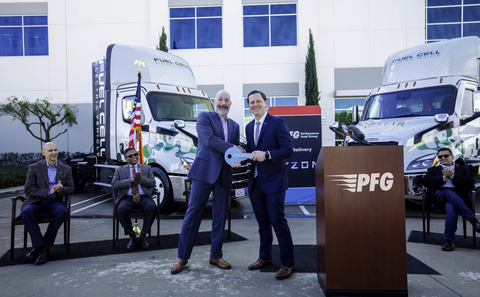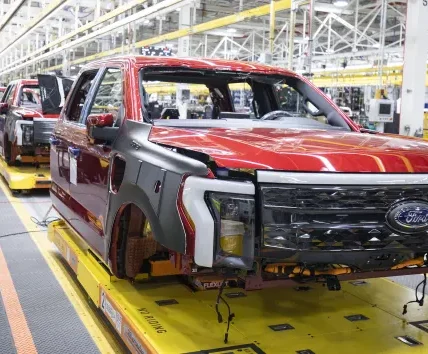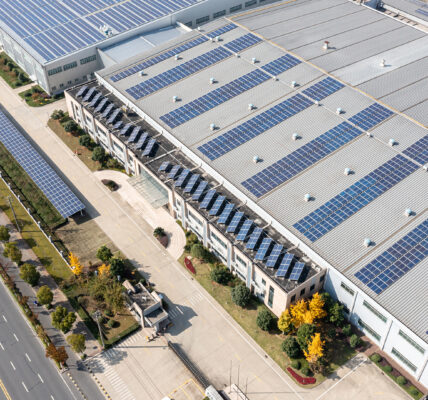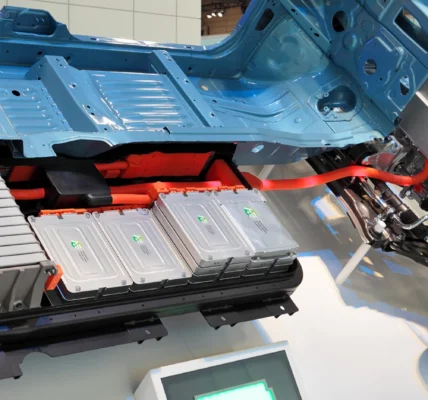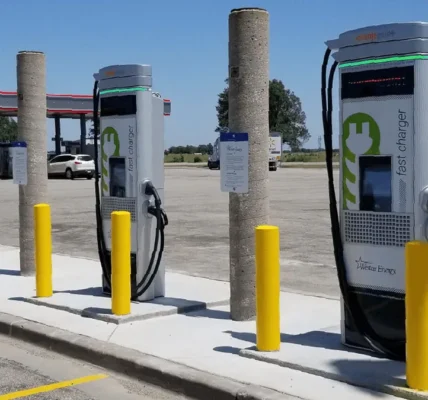Hyzon Motors Inc. (Hyzon) (NASDAQ: HYZN), a leading hydrogen fuel cell technology developer and global supplier of zero-emission heavy-duty fuel cell electric vehicles (FCEVs), today announced that it delivered four FCEVs to leading food distributor and supplier Performance Food Group (PFG) (NYSE: PFGC), in a joint ceremony. The event, held at PFG’s Vistar facility in Fontana, was attended by local government leaders, company leaders, and PFG associates, and showcased the new FCEVs by offering ride along demonstrations.
“Putting these zero-emission trucks on the road marks an important step toward decarbonization goals shared by PFG, Hyzon and the state of California,” said Parker Meeks, Chief Executive Officer of Hyzon. “Our fuel cell technology will help Vistar’s heavy-duty trucking operations operate emission free and with reduced noise pollution. We are deeply grateful for our partnership with PFG, as it helps to further our collective goals to reduce carbon emissions from heavy-duty trucking.
”Meeks added, “The deployment of these vehicles is a major milestone for Hyzon’s industry leading technology, and through this partnership we expect to gain valuable insight through real-world operations. Further, we expect that this intelligence will help us to optimize our technology, while working simultaneously to develop the next-generation 200kW fuel cell system.”
Hyzon’s hydrogen FCEVs have an expected travel range of up to 350 miles today and an expected refueling time of fifteen minutes with fast fill dispensing. PFG plans to insert the vehicles into its fleet and put them in service to deliver snacks, candy, and beverages to its customers. The vehicles will be fueled with hydrogen delivered by Pilot Travel Centers LLC, a leading fuel and energy provider with the largest network of travel centers in North America.
The delivery comes six months after Hyzon and PFG initially announced their fuel cell electric vehicle agreement. Hyzon is one of the first companies to deliver a heavy-duty fuel cell electric truck, also referred to as tractors, in the U.S.“Food distribution is an essential service and critical to the companies and communities we serve. As we look towards the future, it’s important for us to work towards sustainability goals and improve our transportation infrastructure,” said Jeff Williamson, Senior Vice President, Operations, PFG. “At PFG, we remain dedicated to reducing our environmental footprint and serving the Southern California region responsibly. We’re excited to have partners like Hyzon as we continue to demonstrate our commitment to being a good neighbor to every community we serve.”
Zero-emission, hydrogen fuel cell vehicles offer similar benefits and convenience as diesel fuel trucks without the harmful emissions that worsen air quality and have negative environmental impacts. Additionally, FCEVs have numerous advantages over battery electric vehicles (BEVs) in terms of payload, range, and refueling time. FCEVs are expected to be around 6,000-8,000 pounds lighter than BEVs, have a longer range, and can be refueled in as little as 15-20 minutes compared to up to three hours for BEV. These factors make FCEVs a natural choice for distribution and heavy-duty freight companies.
Vistar’s southern California office is located in Fontana, a suburb of San Bernardino with more than 200,000 residents and hundreds of businesses that depend on the company’s food and beverage distribution services. The company has been at the forefront of transitioning away from diesel to reduce the amount of harmful emissions being spread nationwide. Last August, PFG and Hyzon announced the successful completion of a landmark demo of Hyzon’s Liquid Hydrogen FCEV through Temple, TX, where the truck demonstrated its ability to deliver commercial loads on a 16-hour continuous route covering more than 540 miles and including temperatures above 100-degrees Fahrenheit.
With the delivery of these vehicles and subject to a successful trial with Hyzon’s next generation 200kW FCEV as previously announced, Hyzon and PFG intend to work together on an agreement for 15 200kW FCEVs and an option for an additional 30 FCEVs.


